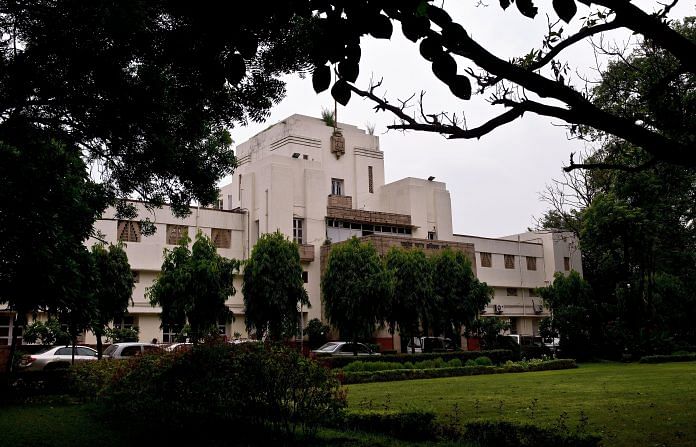The NHRC has rarely made its presence felt. The Modi government has also done its bit to ensure it is not free to function.
Kashmir and United Nations High Commissioner for Human Rights are in the news now after a report released last week. The report sought the “establishment of a commission of inquiry to conduct a comprehensive independent international investigation into allegations of human rights violations in Kashmir”. And, in an unprecedented move, asked the governments of India and Pakistan to fully respect the “right of self-determination” of the people of Kashmir.
The self-determination part clearly shows that UN High Commissioner for Human Rights Zeid Ra’ad Al-Hussein, the person responsible for the shoddy report, hadn’t done his homework before giving final touches to the report.
However, the UN is a toothless body, whose writ doesn’t run beyond the areas where the five veto powers have no interest.
But, what about our own National Human Rights Commission (NHRC)?
Established under the Protection of Human Rights Act, 1993, the NHRC seems to have given up its main job – acting as a premier watchdog to protect the rights of each and every citizen of this country, including those living in Kashmir and the northeast. The body seems to have decided to unilaterally give up its powers.
The problem in Kashmir
Courtesy legal challenges mounted in the Jammu and Kashmir high court by successive governments, the NHRC has been successfully stalled several times in its quest to look at issues of human rights violations in the state. The state governments have questioned the locus standi of the NHRC to investigate cases of human rights violations in Jammu and Kashmir citing Section (2) of The Protection of Human Rights Act, 1993.
This clause, in a way, bars NHRC from intervening in Jammu and Kashmir as far as matters related to the List II of the VII Schedule of the Constitution of India are concerned.
Thus, any human rights violations of the citizens of Jammu and Kashmir can’t be looked into by the NHRC if the same have been committed by, let us say, the state police.
Bizarre? Aren’t Kashmiris citizens of India? Should mere technicality stop the NHRC from ensuring that Kashmiris get justice like citizens in the rest of India?
In dozens of cases of human rights violations, the state government has refused to accept NHRC’s directions. In several cases, the state has even refused to participate in proceedings before the commission on the plea that its special category status allows it to not accept the NHRC’s jurisdiction.
A few years ago, the chairman of NHRC Justice K.G. Balakrishnan had talked about the need for the centre as well as the Jammu and Kashmir government to end the confusion.
Since then, in several cases, the Jammu and Kashmir government has questioned the NHRC’s jurisdiction.
But, if the lacunae in the law have ensured that the role of the NHRC vis-à-vis Jammu and Kashmir remains mired in confusion, the NHRC needs to ask itself if it has played its role effectively in the rest of the country.
No pushing the envelope
Most Indians, except those whose job it is to follow the affairs of the commission, won’t be able to recall who heads the NHRC now. When was the last time you heard the current chairman Justice H.L. Dattu make a statement to reassure the masses that the body is still functioning?
But every year, without fail, the body holds a function to celebrate the Human Rights Day and organises a painting competition.
In most cases, including seemingly fake encounter deaths, where it issues notices to state governments, there is seldom news of what action, if any, was taken as a result.
As it is, the commission is just a recommendatory body, and cannot issue legally enforceable directives. But it is expected of the NHRC chairperson and its members to push the envelope, expose state governments, which fail to implement its recommendations using several excuses.
Unfortunately, the push doesn’t come often.
The government of Prime Minister Narendra Modi, like it has done with several other such institutions, has also done its bit to ensure that this commission is not free to function without hurdles.
For example, the commission functioned without a full-time DG (Investigations) for several months, and a posting in NHRC is now seen as punishment posting.
Much before Justice Dattu was appointed as the NHRC chairperson, I had written in my report for The Indian Express that the Modi government was waiting for his retirement as CJI to make him the NHRC chief. So much for transparent selections!
Then, the government decided to appoint BJP leader Avinash Rai Khanna as a member of the NHRC. In a first, an active partisan politician’s name was cleared by the selection committee. However, Khanna’s appointment was never given effect after I reported the move and the government developed cold feet. But the most surprising aspect of the move was the manner in which Congress’s leader of opposition in the Rajya Sabha Ghulam Nabi Azad emerged as a willing party in the plan to appoint Khanna.
The move once again highlighted how little importance is attached to the body that is tasked with protecting our rights.
Forget the UN and its sub-groups, it is the NHRC and its lack of zeal in doing its job properly that should worry the citizens.




Caged parrots all!